Porc Fest: Libertarians Gone Wild
Guns. Families. Nudists. Economists. ‘Free staters’ are flocking to New Hampshire.
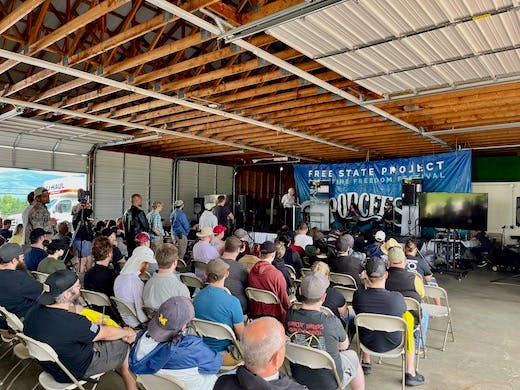
At first pass while walking around Porc Fest, the camping and ideas festival held by the Free State Project in the White Mountains of northern New Hampshire, I thought it would be easy to dismiss this ragtag group advocating for the mass migration of libertarians to the “Live Free or Die” state. The “free staters,” though, are having a real and growing influence on New Hampshire politics.
“They’ve been pretty darn successful,” a former Democrat congressman from New Hampshire’s 2nd district, Paul Hodes, tells the Sun. “They’re having an impact on New Hampshire politics. I think they’ve had a huge impact on the New Hampshire Republican Party. I think that they have infiltrated every level of the Republican establishment.”
The idea for the Free State Project grew out of an essay written in 2001 by a doctoral candidate in political science at Yale, Jason Sorens. He urged “freedom-minded people” to choose a small state, move there en masse, and gain significant enough numbers to take over state government.
“Libertarian activists need to face a somber reality: nothing’s working,” Mr. Sorens wrote of the Libertarian Party’s failure to gain traction among voters. He also called for secession from the United States, though that idea divides free staters today.
With a population of less than 1.4 million and an already liberty-minded ethos, New Hampshire was chosen in 2001 as the official location of the would-be free state. The Free State Project’s motto is “liberty in our lifetime.”
More than 20,000 libertarians have signed the Free State Project’s pledge to move to New Hampshire within the next five years. More than 6,000 have already moved to the state, according to the Free State Project’s co-chairwoman, Carla Gericke, who says many more move but never sign the official pledge.
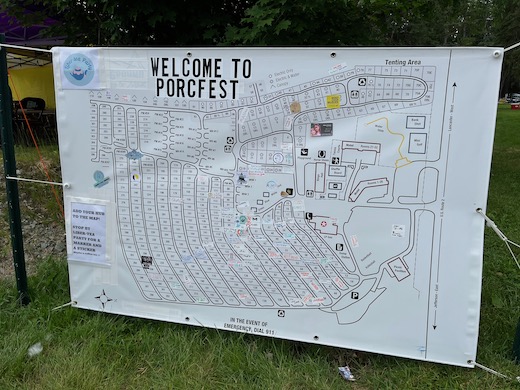
Porc Fest, which I attended last week, is the group’s annual, week-long summer gathering to “showcase the community and show people these ideas really work,” Ms. Gericke tells the Sun.
+++
When I got out of my car at Roger’s Campground after a three-hour drive north through the mountains, the first group I encountered consisted of three men carrying assault rifles and a pregnant woman walking a dog. As a lifelong New Yorker who’d only recently moved to New Hampshire — not as a free stater — I worried about how guns, drinking, and camping would mix.
“Porc” is short for porcupine, a libertarian symbol because the animal is not aggressive, but will use its quills defensively. Libertarians abide by the non-aggression principle, or NAP, which abhors the initiation or threat of forceful interference against persons or their property.
This principle guides libertarians’ anti-war, free-market, capitalistic beliefs, their ardent defense of the 2nd Amendment, and their “live and let live” ethos regarding drug use, prostitution, or any behavior that doesn’t infringe on the rights and property of others.
Ms. Gericke describes Porc Fest this way: “People are armed to the teeth, kids are just running around, everyone is doing what they want to do, and it’s very peaceful, nonviolent, friendly. Other than we all agree on the non-aggression principle, I don’t think we agree on much else.”
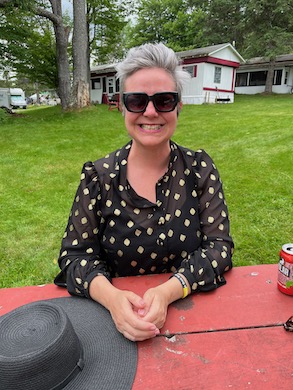
The event combines camping with lectures, workshops, stand-up comedy, and family-friendly activities.
The director of the Soho Forum, Gene Epstein, a former economics editor at Barron’s, hosted a debate with antiwar radio host Scott Horton and journalist Cathy Young on the American intervention in Ukraine.
Economist David Friedman, son of the late Nobel laureate Milton, held several talks, including one on anarcho-capitalism. The Mises Caucus, which took over the Libertarian Party at their Reno, Nevada, convention in early June, hosted events at their tent.
I also watched six nude men do the long jump, shot put, and archery in the “Naked Olympics” — though, to be fair, not every competitor was fully nude: one had a 9mm handgun strapped to his leg.
More than 3,000 people attended Porc Fest last week, when the schedule contained hundreds of events. There were cryptocurrency seminars and workshops on homeschooling, knitting, Christian Bible quotes, and how to make a 3D-printed ghost gun. People openly smoked marijuana, sold moonshine, food, and clothing, and operated like the campground was already a free state. Many vendors accepted cyrpto or Goldback currency as payment.
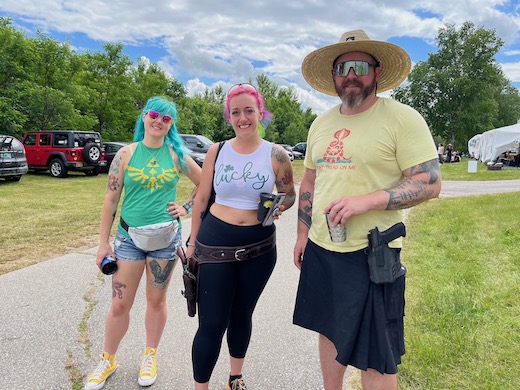
Young kids hawked printed versions of the online schedule for a dollar apiece each morning. Many of the parents I spoke with advocated a free-range style of parenting.
+++
People decide to uproot their lives and move to the “free state” of New Hampshire for different reasons. Ms. Gericke, who grew up in South Africa, said she found the Free State Project online after she and her husband lost their jobs in the early 2000s dot-com bust and then saw what she described as a “police state” assault on liberty post-9/11. They signed the pledge in 2003 and moved to New Hampshire in 2008.
“There are a lot of immigrants in this movement. Russians, Ukrainians, South Africans, Chinese. It’s because we are like, wait a second, we know what this looks like,” Ms. Gericke said.
Elliot “Alu” Axelman, a paramedic from Queens, moved to New Hampshire as a free stater in 2017. “De Blasio and Cuomo radicalized me,” he told the Sun, referring the former New York City mayor and that state’s ex-governor. Mr. Axelman is active in the secession movement, and says he played a role in drafting the New Hampshire secession bill that failed in the legislature in March, garnering 13 votes.
Glen Dickey, a software developer, moved from California with his wife 15 years ago and served a term in the New Hampshire house as a Republican. He describes himself as a “minarchist” — that is, one who believes in “small government but not no government.” He ran for office as a Republican because “it’s easier to sell liberty to Republicans than it is to sell organization to anarchists, to libertarians.”
The man who organized the “Body Freedom” nudist tent works at the intersection of tech and medicine, has a PhD in bioengineering, and moved to New Hampshire from San Francisco in 2021 to escape high taxes and what he described as “oppressive” politics. Before signing the pledge, he attended a Porc Fest to make sure it was “a real libertarian community,” and not a conservative front.
Others I spoke with mentioned Covid restrictions, vaccine mandates, identity politics, cancel culture, and the desire to homeschool their kids and carry guns. “Definitely because of the Covid stuff, we are seeing way more families,” Ms. Gericke said.
More than 1,000 free staters moved to New Hampshire in 2021 alone — the highest yearly total to date.
Homegrown libertarian Granite Staters also now identify as free staters. I spoke to several men in their early 20s who’d learned about libertarianism and the Libertarian Party through popular podcasts hosted by Tom Woods, Reed Coverdale, and comedian Dave Smith, the Libertarian Party’s favored candidate for president in 2024.
+++
The LP, third largest political party in the country, is often conceived of as a middle ground between Republicans and Democrats: socially liberal but fiscally conservative. The Libertarian Party championed gay rights and marijuana legalization long before Democrats embraced the issues.
The longer I hung out at Porc Fest, though, the less convinced I was of that description. While I heard attendees criticize Democrats and Republicans in equal measure, I saw far more “Let’s Go Brandon” T-shirts than anti-Trump paraphernalia, and most of the free staters who run for office do so as Republicans. Only a couple have run as Democrats.
The Mises Caucus takeover of the Libertarian Party in early June has also raised some concern among Libertarians that the party is bending over backward to court conservative members. The Mises Caucus envisions itself as the Ron Paul Revolution 2.0, but with edgier, more confrontational messaging.
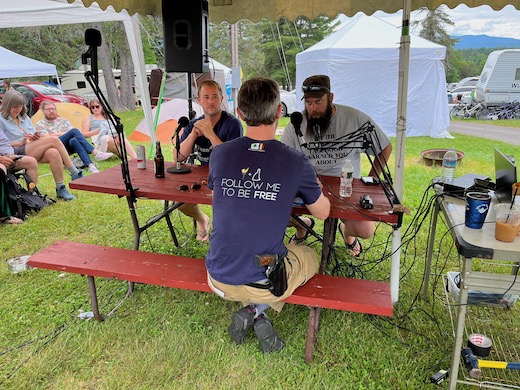
At the convention, the party removed its commitment to abortion rights and weakened an anti-bigotry statement in its platform. “We were closing the door on people that have conservative values for so long, and we wanted to open the door to those people,” the Libertarian National Committee vice chairman, Joshua Smith, tells the Sun. Mr. Smith says that the party’s new focus will be on messaging and winning in smaller, local elections. He called the party’s previous messaging “woke.”
“The Libertarian Party has been for the last few decades what we call ‘regime libertarians.’ They wanted to get in good with the D.C. champagne crew. We at the Mises Caucus especially realize that’s never going to happen,” Mr. Smith said.
Older attendees at Porc Fest frequently called me over to chat after seeing my bright orange press pass. The younger crowd, though, were hesitant to speak with me and expressed deep distrust of the press.
“Are you going to write that we’re all racists?” a man of South Asian descent joked in a somewhat confrontational tone as I approached a tent where a group of men in their 20s and 30s sat around a picnic table with a tray of pot-infused Rice Krispies treats, while another heavily tattooed man filed down a 3D-printed gun at the table behind us.
These younger Libertarians celebrated the Mises Caucus takeover of the Libertarian National Committee and the New Hampshire Libertarian Party, and they used truculent, politically incorrect language that was reminiscent of the New Right and internet trolls. There was talk of “red pilling” and jokes about racism, antisemitism, and abortion.
This was a decidedly mixed-race group, several identifying themselves as Jewish, and the conversations more than anything seemed to be a direct and combative rejection of left wing censoriousness, as well as conservative social mores. It was shock as a political statement in itself.
A member of the Mises Caucus and the New Hampshire Libertarian Party’s candidate for U.S. Senate, Jeremy Kauffman, says locating the Libertarian Party within the left-right duopoly is difficult and “a fight inside the LP. Some people think of Libertarians as more centrist and some people think of it as more extreme than anything else.”
Even though abortion rights is a divisive wedge issue among LP members, on Friday, after the Supreme Court released its decision overturning Roe v. Wade, Mr. Smith tweeted: “It should never have been morally, ethically, or legally ok for you to kill babies because you are irresponsible with who you let have sex with you. Make better choices. #HoeVsWade”
Mr. Smith’s Twitter account is currently suspended, though not as a result of that tweet. Mr. Kauffman is also known for his inflammatory tweets.
Economist David Friedman expresses concern about this potential rightward push in the new Mises-led Libertarian Party. “There are several things which made me wonder if they were going to weaken libertarian principles to appeal to the right, just as it seemed to me that the people who had been running the party had been doing it to appeal to the left. But whether that’s true, I will have to see,” he tells the Sun.
+++
As a nonprofit, the Free State Project does not take political stances or align with a political party. It is not formally associated with the Libertarian Party in any way. The organization encourages “liberty lovers” to move to the state and helps with logistics, but it is only one element in a larger free state movement. Free staters have set up club houses and homeschooling centers, and work separately with groups like the New Hampshire Liberty Alliance, which rates legislation and legislators on a pro- or anti-liberty scale.
“Part of the movement does try to emphasize or encourage that if you’re here it’s not enough to just be a libertarian, you’ve got to be helping make the state more free,” Mr. Kauffman says.
There are more than 30 elected free staters in the New Hampshire state legislature, though they generally run as Republicans, not Libertarians. The house majority leader, Jason Osborne, a Republican, moved to New Hampshire in 2010 as part of the Free State Project. He “was here at Porc Fest singing karaoke a decade ago,” Mr. Kauffman says.
Another state representative, John Burt, a Republican, describes himself as “a pre-stater,” because he moved from the “socialist republic of Vermont” to New Hampshire in 1998. When he first got elected to the House in 2010, he tells the Sun, there weren’t as many liberty-minded representatives. Now, when he introduces a bill, he says he is “pretty much guaranteed 60 to 70 votes.” This past year, he says, the liberty bloc increased to 100.
“I think they have a lot of influence,” Mr. Burt says of free-staters.
Gun rights is a prime example. Last week, New Hampshire’s moderate Republican governor, Chris Sununu, by no means a free stater, signed HB 1178, a bill Mr. Burt sponsored to prohibit state and local police from enforcing any federal gun laws or Executive Orders that restrict the right to bear arms further than the state’s own regulations.
Mr. Sununu responded to the Sun’s request for comment on the free state movement with this statement: “New Hampshire is a unique and small state where anyone can run for office, anyone can win, and anyone can make a difference.”
+++
Moving to a different state for ideological reasons may seem like a crazy idea, but the exodus of Americans from big blue cities to red states during the last two years of Covid offers some vindication of this premise. Recent Supreme Court rulings upholding federalism have reintroduced the concept to many Americans that what state you live in can have a big impact on not only your tax burden, but what rights you enjoy.
“Make States States Again,” was a common slogan on hats and stickers at Porc Fest.
At night, I relaxed in a folding chair around the main campfire with a group of 30 people. To my left sat economist Jeffrey Tucker in a three-piece suit and bow tie; to my right, a shoeless, self-described anarchist and free stater, a Bitcoin entrepreneur from Brooklyn, and some families with small children.
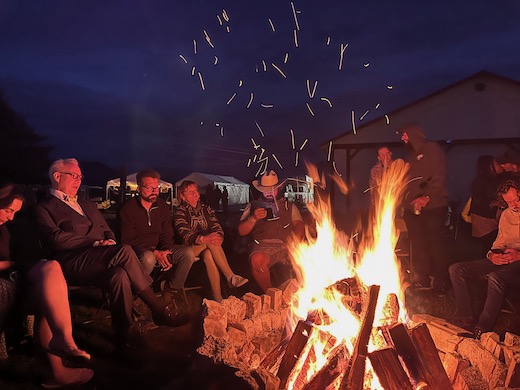
Directly behind me a blond woman sat huffing nitrous oxide directly out of a two-foot metal tank. I scanned the circle and thought to myself: What a strange mix of people. But everyone was talking and laughing. The people I spoke with all emphasized how fun the event is and how they look forward to it every year.
Mr. Smith tells me that the Libertarian Party will start talking more about the Free State Project moving forward. And as the number of free staters in New Hampshire grows, so will its political power.
Mr. Dickey has doubts about the pace: “I don’t know if there will be liberty in my lifetime, but there might be in my kid’s lifetime,” he says.

